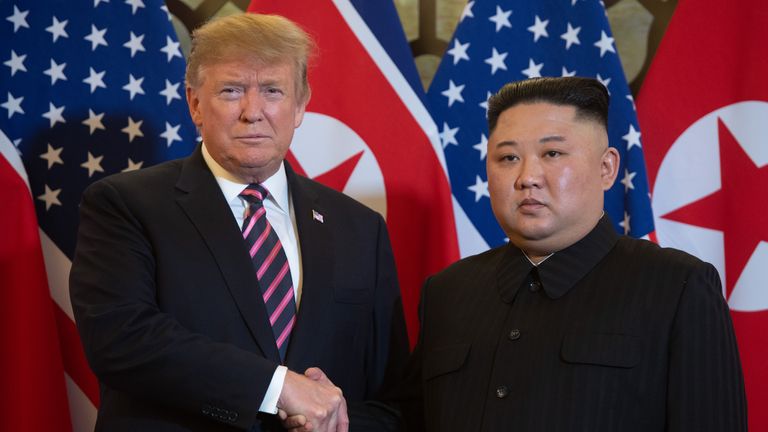A missile fired from a US Navy warship in the Pacific Ocean successfully intercepted a test intercontinental ballistic missile (ICBM) for the first time, the US military has announced.
It marks the first successful test of the US missile defence involving interceptors being launched at sea, though ground-based stations in Alaska and California have previously tackled test ICBMs.
It comes just over a month after North Korea paraded a new ICBM during an early morning military display, the largest it has ever shown off, carried on a 22-wheeled transporter.
The test ICBM was launched from a missile defence test site on the Kwajalein Atoll in the Republic of the Marshall Islands, and was fired towards the ocean northeast of Hawaii.
It had originally been scheduled to launch in May of this year, but the event had been postponed due to restrictions in personnel and equipment movement due to the COVID-19 pandemic.
Sailors aboard the USS John Finn, a destroyer equipped with an Aegis ballistic missile defence system, used military satellites to track the ICBM and then launched a SM-2 Block IIA guided missile to destroy the target.
It was described as “an incredible accomplishment and critical milestone” by Vice Admiral Jon Hill, the director of the US missile defence agency.
Vice Admiral Hill added that the US department of defence was investigating whether it could add sea-based interceptors to its ground-based defence systems “to hedge against unexpected developments in the missile threat”.
He described the test as adding valuable evidence to the role that warships could play in the case an ICBM was launched across that ocean towards the US.
Nuclear diplomacy between North Korea and the US has largely stalled since the breakdown of the second summit between Donald Trump and Kim Jong Un in Vietnam in February 2019.
After the failed Hanoi summit, North Korea has carried out several short-range missile and other weapons tests.
Mr Trump has downplayed these tests, saying they did not pose a direct threat to the US mainland.
The two countries have been in a face-off for months over the next steps in their negotiations, with North Korea refusing to disarm in return for a reprieve on its sanctions – dashing hopes of denuclearisation on the Korean peninsula.
During a rare meeting of his ruling party, Mr Kim also said that his country would not put its security at risk in exchange for economic benefits, and that it would never denuclearise unless the US ends what he called its “hostile policy”.


